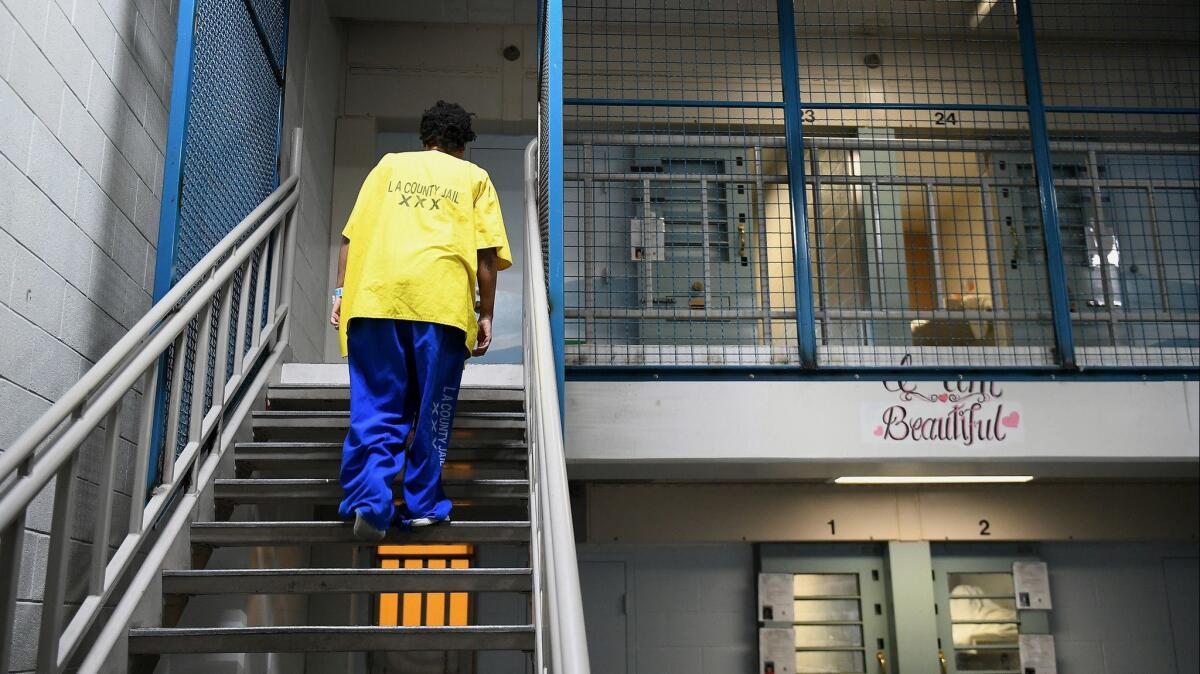Editorial: A ‘justice’ system that frees the monied and locks up the poor isn’t worthy of the name

- Share via
A “justice” system that frees people who can afford to pay while locking up those without means is not worthy of the name. Yet the American system of justice — touted by the privileged as the world’s shining example of equality and fair play — is shaped by wealth and poverty. It rewards people with money and compounds the misery of the poor.
The most obvious example is the bail system. Arrest the rich, and they can put up the full amount and walk free. The middle-income person can pay a lesser amount to a bond company and, again, go free, although at a cost. But the destitute, with no money to pay the court or the bondsman, must sit in jail, punished for their poverty.
That’s one of the privileges of wealth. But it’s the privilege of race, too, in a society in which wealth disproportionately belongs to whites and poverty disproportionately plagues African Americans and Latinos.
And it’s not just bail. Wealth and poverty affect, and in a sense, pervert many levels of the justice system.
These fees do not punish poor decisions. They punish the inability to pay.
Consider Velia Dueñas, an indigent, homeless and disabled mother of two whose case came before the California’s Second District Court of Appeal this month. Her story, detailed in the court’s opinion, reads as though it had been cribbed from a Charles Dickens novel.
As a teenager, Dueñas received three traffic tickets but couldn’t afford the more than $1,000 in fines. As a result, her license was suspended. Still, she kept driving. She had to.
For perhaps many thousands of Californians, no car means no job, no income, and perhaps no food and no roof. You scrape together what money you can for gas because a car is a lifeline. When that line is cut, and when there are no parents and no savings to fall back on, you go homeless and hungry.
Because Dueñas kept driving with a suspended license — a misdemeanor — she was repeatedly charged, convicted and given the “choice” to pay fines or go to jail. Jail meant missing work, losing income and letting mounting debts go unpaid. But she had no money for the fines, so like too many other impoverished Americans, her poverty chose for her. She went to jail.
But at least her jail time lifted the financial burden of the penalties, didn’t it? No, not in this Dickensian system. The state has tacked onto fines a variety of fees and assessments that follow the impoverished offender out of jail, even after the base fines are extinguished. There is a court operations fee. A court facilities fee. And on and on.
These fees have no rehabilitative value and serve no punitive purpose. They’re just the way the state pays for some things.
After the 2014 fatal police shooting of Michael Brown in Ferguson, Mo., a U.S. Department of Justice investigation into the local police department found that the city used fines, fees and court costs, imposed overwhelmingly on impoverished African Americans, to pay for municipal government. Failure to pay meant driver’s license suspensions, jail — and more fees. It’s an oppressive, racially unjust system, packaged as equal justice under law.
The nation huffed its disapproval, but missed the fact that similar practices hold sway, to one degree or another, in other cities and states, including California.
Dueñas had gone to jail because she couldn’t afford the fines, so of course could not afford the $30 court facilities assessment, the $40 court operations assessment or the $150 restitution fine. The debt, and the cycle, continued.
Enter the Fray: First takes on the news of the minute »
And for what purpose? The fees do not punish poor decisions. They punish the inability to pay.
Dickens mocked 19th century England’s justice system but often gave the heroes of his books a magical escape through some unlikely benefactor. A previously unknown rich relative, perhaps.
In the 21st century United States, where we exalt our system of justice as an exemplar for the world, we ought to be able to do better. The Court of Appeal certainly thought so, and on Jan. 8 ordered courts to make findings about a defendant’s ability to pay before imposing fees on Dueñas and others in her position — much as a handful of courts around the nation have required before permitting money bail.
But even that is merely a stopgap. California’s Legislature in recent years has begun curbing some of the most abusive fines and fees, but what’s missing is a comprehensive look at, and overhaul of, the justice system, with the role of wealth and the impact of poverty in the forefront. Without that, we will not be as removed from Dickens’ era as we would like to believe.
Follow the Opinion section on Twitter @latimesopinion and Facebook.
More to Read
A cure for the common opinion
Get thought-provoking perspectives with our weekly newsletter.
You may occasionally receive promotional content from the Los Angeles Times.










